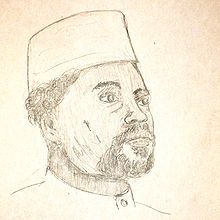
Publisher:
Bonnie King
CONTACT:
Newsroom@Salem-news.com
Advertising:
Adsales@Salem-news.com

~Truth~
~Justice~
~Peace~
TJP
Mar-04-2012 15:57

 TweetFollow @OregonNews
TweetFollow @OregonNews
Chad: Bring Former Chadian Dictator Hissène Habré to Justice
Salem-News.comSalem-News.com Eye on the World report.
 Former Chadian dictator Hissène Habré is a wanted war criminal, he needs to be extradited to a nation for trial. |
(DHAKA- Bangladesh) - The voice of the victims of the former Chadian dictator Hissène Habré, grows more silent by the day, as more of his victims continue to die, while he lives abroad as a wanted war criminal.
 Former Chadian dictator Hissène Habré |
He stands accused in thousands of political killings, and of committing systematic torture from 1982 through 1990. For 21 years, victims have sought to bring Habré to justice, the tragedy is compounded by a growing number of survivors who have already died.
Our goal with Eye on the World is to illustrate and highlight politically oriented problems and tragedies that traditional media channels don't have time or interest in covering.
The world has its own set of laws that were agreed upon by the ruling nations in 1948, and many people are not aware of this simple fact. At the root of the concept of world citizenry itself, is the United Nations Universal Declaration of Human Rights, an overriding and supreme law that ensures many essential human rights that governments today fail to observe. Also central to any hope of human success, is the understanding of the human hierarchy of needs, as defined by Abraham Maslow- more information on this at the conclusion of this entry. We must use the Internet as a tool of justice at every junction, and we need to assist all human beings, everywhere, and not allow cultural, racial or religious preferences as determiners.
In this letter, William Gomes contacts Chad's Honorable Foreign Ministers, saying the most realistic option to avoid impunity for the mass crimes allegedly committed by Hissène Habré, and the option supported by Chad, is to extradite him for trial to Belgium. Gomes calls on the African Union to support the option so victims can finally obtain justice.
| “ |
Honorable Foreign Ministers, I have the honor of writing you in the name of the victims of the former Chadian dictator Hissène Habré, accused of committing thousands of political killings and systematic torture between 1982 and 1990. The victims have been fighting for more than twenty-one years to bring Habré to justice, and a number of survivors have already died. As you know, in July 2006, the heads of state and governments of the African Union gave hope to the victims when they mandated Senegal “to prosecute and ensure that Hissène Habré is tried, on behalf of Africa, by a competent Senegalese court with guarantees for fair trial.” More than five years later, Senegal has yet to execute this mandate and has now informed the African Union that Habré will not be tried in Senegal. Following the refusal of Senegal to prosecute Habré, the Chadian government took the responsible decision on 22 July 2011 to ask Senegal to extradite Habré to Belgium, a country which had already sought his extradition in 2005. Senegalese courts recently declared a Belgian extradition request inadmissible on technical grounds, but Belgium has said it will file a new extradition request by late January. On 4 January 2012, Senegalese President Abdoulaye Wade announced that he will extradite Habré to Belgium if the courts approve the request. I support this option as time is the critical factor in this case. Extraditing Habré to Belgium is the most practical and timely option to ensure that he responds to the charges against him with all the guarantees of a fair trial. In Belgium, a trial could be organized quickly. A Belgian investigating judge, with the assistance of police detectives specialized in the prosecution of crimes against humanity, examined the charges for four years. The team visited Chad in 2002, interviewing Habré’s former accomplices and victims of his regime and analyzing thousands of documents from the archives of Habré’s political police. This strong evidence allowed a Belgian judge to indict Habré on charges of crimes against humanity, war crimes, and torture. I take note of the willingness of Rwanda to organize this trial in response to an inquiry from the African Union. This offer brings honor to Rwanda, which has also suffered from atrocities committed on its territory. However, we believe that pursuing this option would call into question the African Union’s efforts to see Habré tried within the strict confines of the law, meaning that the fate of the case should be decided by the courts in accordance with Senegal’s international legal obligations. The law offers a clear response to Senegal’s refusal, for more than five years, to discharge the African Union’s mandate: the extradition of Habré to Belgium. Moreover, we are particularly concerned that additional years may be needed for Rwanda to enact a legal framework allowing its courts to prosecute crimes that have no direct link to the country, to secure financing for the trial, to restart a complex transnational investigation, and finally to request Habré’s extradition. These are years in which more survivors are likely to die. I understand and share the desire to see Habré tried in Africa. More than anyone, I have relentlessly attempted to bring about such a trial for years. Despite our efforts, the time has come to face the fact that the justice tirelessly sought by the victims has not been forthcoming and that, since 1990, the victims have been subjected to what Archbishop Desmond Tutu and 117 groups from 25 African countries denounced in July 2010 as an “interminable political and legal soap opera.” In July 2011, Navi Pillay, the UN High Commissioner for Human Rights, reminded Senegal that “it is a violation of international law to shelter a person who has committed torture or other crimes against humanity, without prosecuting or extraditing him.” In November 2011, the UN Committee against Torture also reminded Senegal of its obligations under the Torture Convention to either prosecute Habré or extradite him to another country which has sought his extradition – in this case Belgium. Today the most realistic option to avoid impunity for the mass crimes allegedly committed by Hissène Habré, and the option supported by Chad, is to extradite him for trial to Belgium. I call on the African Union to support this option so that the victims can finally obtain justice. I thank you in advance for your attention to this matter and kindly request that you accept my highest consideration. Sincerely, William Nicholas Gomes |
” |
William’s Desk
William’s Desk
www.williamgomes.org
Maslow's hierarchy of needs
As children we are educated in right and wrong, we are told how to conduct ourselves; we learn both expectations and limitations, and from that point we go forth with these tools, and our individual personalities, and fail or succeed accordingly.
In school we quickly understand that without paper, there is no place to write. Once we have paper, a pen or pencil is required to move to the next point. There is a great analogy that exists between this simple concept of paper and pen, and what we know today as Maslow's hierarchy of needs- the theory in psychology proposed in Abraham Maslow's 1943 paper A Theory of Human Motivation.
He demonstrated how without the correct necessities, a person can do little good for themselves, and has none to offer for others. However when people are housed and have clothing, heat, food, health and security, anything is possible. However if just one of these dynamics is removed from the mix, the chance for success can be adversely affected.
Wikipedia describes Maslow's hierarchy of needs as a pyramid consisting of five levels:
The lowest level is associated with physiological needs, while the uppermost level is associated with self-actualization needs, particularly those related to identity and purpose.
The higher needs in this hierarchy only come into focus when the lower needs in the pyramid are met. Once an individual has moved upwards to the next level, needs in the lower level will no longer be prioritized. If a lower set of needs is no longer be met, the individual will temporarily re-prioritize those needs by focusing attention on the unfulfilled needs, but will not permanently regress to the lower level.
For instance, a businessman at the esteem level who is diagnosed with cancer will spend a great deal of time concentrating on his health (physiological needs), but will continue to value his work performance (esteem needs) and will likely return to work during periods of remission.
And finally, if you care about our efforts, please help us by sending a donation, we seriously need it as ad revenue is very limited, and we aren't doing this to make money. Your support allows our attention to remain with content which is vital. There is a PayPal logo at the top of Salem-News.com. Please help us fight the good fight.
Our PayPal email is bonjtheartists@hotmail.com
Special thanks to William's Desk
 |
 |
 |
 |
Articles for March 3, 2012 | Articles for March 4, 2012 | Articles for March 5, 2012
Salem-News.com:




Terms of Service | Privacy Policy
All comments and messages are approved by people and self promotional links or unacceptable comments are denied.
[Return to Top]
©2026 Salem-News.com. All opinions expressed in this article are those of the author and do not necessarily reflect those of Salem-News.com.